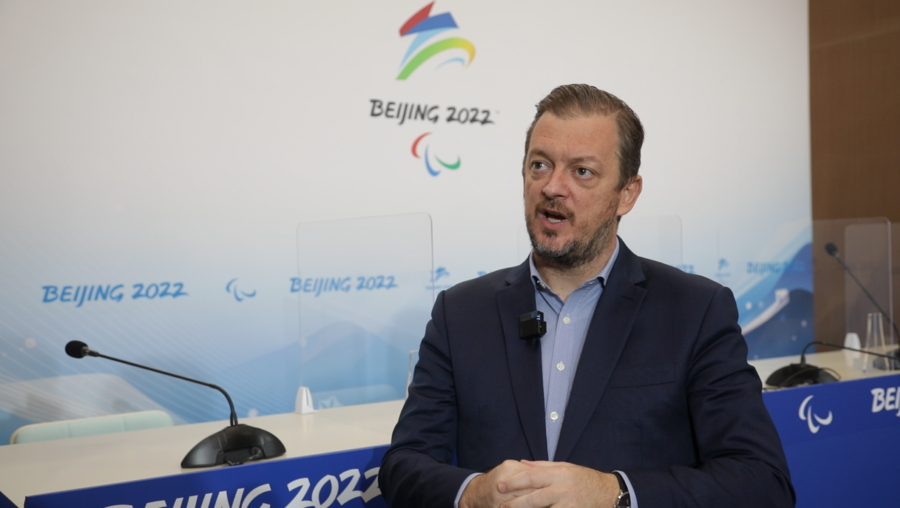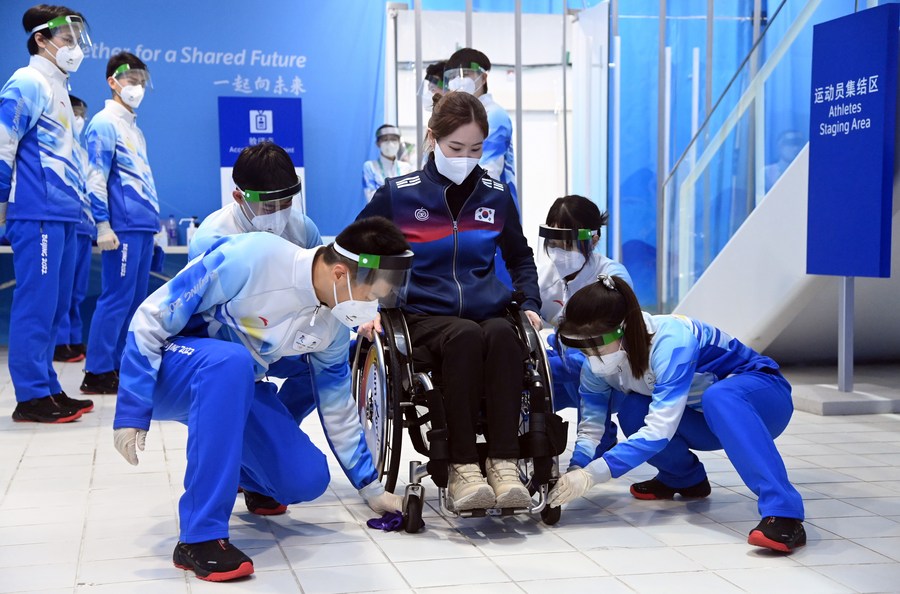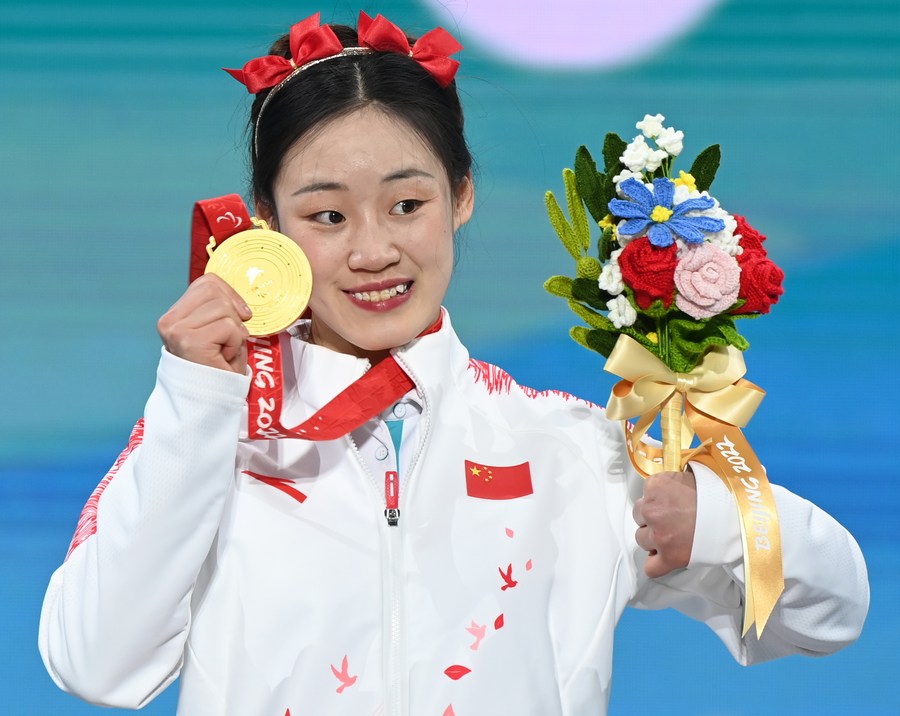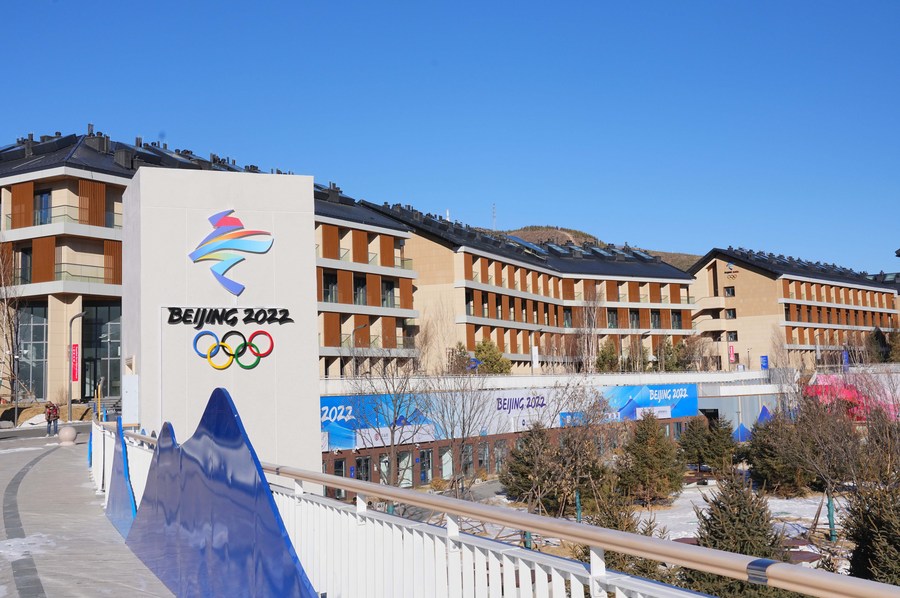BEIJING, March 12 (Xinhua) — Beijing 2008 changed the way the Summer Paralympics was delivered forever, and this will be the same with the Winter Paralympics, said International Paralympic Committee (IPC) president Andrew Parsons.
As the Beijing 2022 Paralympic Winter Games is about to come to an end, Parsons shared his experience and thoughts on Beijing 2022 in an exclusive interview with Xinhua.
FULFILLING COMMITMENTS
Making his first trip to China in 2005, Parsons was surprised at how China has changed in the past 17 years. Despite being in the closed-loop during the Beijing Winter Paralympics, Parsons said he has seen a “more modern city” on his way to the Yanqing and Zhangjiakou competition zones.
The IPC chief was also impressed by China’s sense of responsibility in fulfilling its promise to host the Games.
“All the different levels of government, the organizing committee, and everyone here, they wanted to deliver great Games in very challenging circumstances,” Parsons said. “And I think they succeeded in that. I’m really impressed with the level of delivery of the Games.”

International Paralympic Committee (IPC) president Andrew Parsons speaks with Xinhua during an exclusive interview. (Xinhua/Mei Yuanlong)
Parsons believes the Beijing Games has send a message of “peace, resilience and hope” to the world.
“I think resilience has a lot to do with Beijing and the Chinese people. The way that you stood out, organized and delivered the fantastic Games, despite the challenges and the COVID-19 pandemic,” he explained.
“The focus was to deliver the best possible infrastructure and services to the athletes. And this is what the organizing committee did. The athletes are very well taken care of,” Parsons added. “There’s a very committed organizing committee. The volunteers are fantastic.”
The Beijing 2022 Winter Paralympics is another global Paralympic sports event held in China after the 2008 Summer Paralympics, which, according to Parsons, is another opportunity to improve the integration of people with and without disabilities for both China and the world.
“Everything here is focused on allowing athletes, providing them the best platform to the best performances and then inspire and change the world,” Parsons added. “So we believe that the legacy will be a future Chinese generation, even more inclusive than what it is today.”

Volunteers clean the wheelchair for an athlete during the Wheelchair Curling competitions of Beijing 2022 Paralympic Winter Games. (Xinhua/Ren Chao)
SEIZING OPPORTUNITY
With one competition day left, Team China is currently leading the tally with a total of 59 medals including 18 golds, while four years ago at PyeongChang 2018, China took its first and only Winter Paralympic medal.
Parsons called this huge progress “incredible”, adding that “it’s brilliant to see how China took the opportunity.”
“Because when hosting the Games, there’s lots of challenges at the same time,” Parsons said. “I think China took advantage of that, attracted more persons with disabilities to practice winter Para sports.”
Parsons praised the Chinese Paralympic Committee as “masters of developing talents” in both summer and winter sports.
“We know that we will still be seeing Chinese athletes winning medals not only here,” Parson noted.

Gold medalist Zhang Mengqiu of China attends the awarding ceremony for the Para Alpine skiing women’s giant slalom standing of Beijing 2022 Paralympic Winter Games, March 11, 2022. (Xinhua/Li Jianan)
According to the Beijing 2022 Organizing Committee (BOCOG), China has been organizing winter sports events for people with disabilities since 2016 and the number of participants has increased from some 10,000 people to more than 300,000.
“In a country with 85 million persons with disability, this is absolutely fundamental,” Parson commented.
“The Paralympic Games is the only global event that put persons with disability at center stage in any area, so it’s a very important platform for persons with disability at a global level,” Parsons said.
“So we can strengthen our message of inclusion, and we want to contribute at a global level to make this a more inclusive world.”
ADVANCING STANDARDS
Parsons has never doubted if the Beijing Winter Paralympics could be held as scheduled despite the impact of the pandemic. He said that since the outbreak, the IPC, together with BOCOG and the International Olympic Committee, has been working with relevant parties to produce the Games’ Playbook.
According to BOCOG, the number of COVID-19 positive cases in the closed-loop has been dynamically dropped to zero during the Winter Paralympics. And the closed-loop management clearly worked well, Parsons thought.
“The numbers during the Olympics show that the concept of a closed-loop really worked. All the countermeasures help to get these numbers very low. And I think we are very satisfied that we are providing the safe environment to the athletes,” Parsons commented.
“So it’s not only about providing them an environment where they don’t get the virus, but they feel that they are safe. And I think this is what we are experiencing here.”

Photo taken on Dec. 30, 2021 shows the Paralympic Village for Beijing 2022. (Xinhua/Yang Shiyao)
Inside the Beijing 2022 closed-loop, Parsons believes there are “some of the best winter sport venues in the world.”
“When it comes to accessibility and [being] barrier-free, I think the athletes can speak even better than I can,” he said. “Our accessibility experts are very happy about that. So far I did not receive any complaint, which is always a good sign.”
“Beijing 2008 changed the way the Summer Paralympics was delivered forever, this will be the same with the Winter Paralympic,” Parsons noted. “A new level of the delivery of these Games was set by Beijing 2022.”
Parsons also lauded the work of volunteers, saying: “if athletes are the beating heart of any edition of the Games, the volunteers are the soul, with their smiles, energy, and enthusiasm.”
“I hope they had the time of their lives working with the Paralympics and working with the Paralympic athletes.” ■













